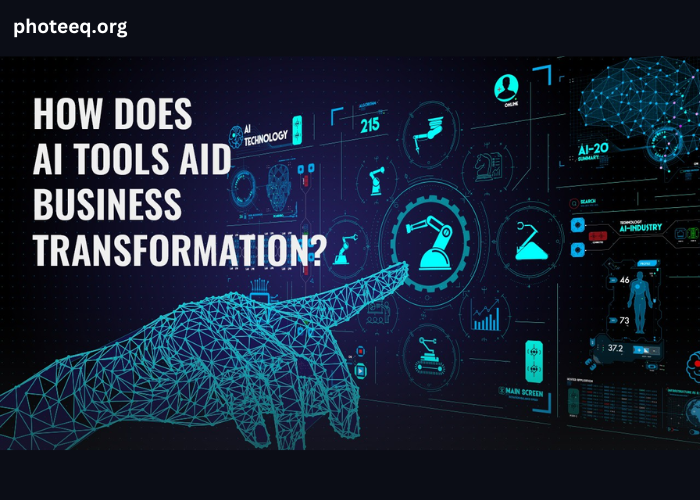
In today’s fast-paced digital economy, artificial intelligence (AI) has emerged as a game-changing force, transforming how businesses operate and compete. From enhancing decision-making processes to streamlining operations, AI tools are reshaping modern business strategies across industries. This article explores the pivotal roles AI tools play in redefining efficiency, innovation, and growth for businesses.
Enhancing Decision-Making with Data-Driven Insights
One of the most significant impacts of AI on business strategies is its ability to process vast amounts of data to provide actionable insights. Traditional decision-making relied heavily on intuition and past experiences, often constrained by human biases. AI tools like predictive analytics, machine learning models, and big data solutions enable businesses to analyze market trends, customer behavior, and operational patterns in real time.
For instance, AI-powered tools such as Google Analytics, Tableau, and Power BI are helping organizations visualize data and identify actionable opportunities. Machine learning algorithms can predict future demand, optimize inventory, and personalize marketing strategies, ensuring better alignment with business objectives.
Revolutionizing Customer Experience
AI tools are transforming the way businesses interact with customers by delivering personalized and seamless experiences. Chatbots, virtual assistants, and natural language processing (NLP) technologies have redefined customer service, enabling businesses to offer 24/7 support.
AI-driven customer relationship management (CRM) tools, such as Salesforce Einstein and HubSpot, analyze customer interactions to offer tailored product recommendations, predict customer needs, and reduce response times. Such improvements not only enhance customer satisfaction but also drive brand loyalty and revenue growth.
Automating and Optimizing Operations
Automation through AI tools is helping businesses achieve unparalleled efficiency. AI-powered robotic process automation (RPA) software can handle repetitive tasks, such as data entry, invoice processing, and scheduling, freeing up human employees to focus on higher-value work.
Industries such as manufacturing, logistics, and finance are benefiting significantly from AI tools like UiPath, Automation Anywhere, and Blue Prism. By streamlining operations, reducing human error, and improving productivity, these tools allow organizations to achieve cost savings and operational excellence.
Empowering Innovation and Product Development
AI is a catalyst for innovation, helping businesses design new products, services, and business models. AI tools enable faster product development cycles by simulating prototypes, analyzing user feedback, and optimizing designs through machine learning algorithms.
For example, AI-driven design tools like Autodesk Generative Design can create multiple design options based on specific criteria, while tools like IBM Watson assist in solving complex problems and uncovering innovative solutions. Businesses leveraging AI for research and development are gaining a competitive edge by accelerating time-to-market and reducing costs.
Improving Human Resources and Talent Management
AI is also transforming how businesses manage their workforce. AI-powered tools are revolutionizing recruitment, employee engagement, and performance management. Platforms like LinkedIn Talent Solutions and Workday use AI to analyze candidate profiles, match skills with job roles, and streamline hiring processes.
Moreover, AI-based employee engagement tools monitor performance, identify training needs, and provide actionable feedback. This enables HR teams to create personalized career development plans and foster a motivated workforce, leading to improved retention rates and productivity.
Mitigating Risks and Enhancing Security
Risk management is a critical area where AI tools are making a significant impact. AI-driven fraud detection systems and cybersecurity tools help businesses identify threats, detect anomalies, and prevent potential breaches in real time.
For example, AI solutions like Darktrace and Palo Alto Networks use machine learning algorithms to analyze network traffic and detect unusual patterns. In finance, AI tools monitor transactions to prevent fraud and ensure regulatory compliance, thereby reducing risks and safeguarding business assets.
Conclusion: The Future of AI in Business
AI tools are no longer optional; they are an essential part of modern business strategies. As organizations increasingly adopt AI technologies, they are unlocking new opportunities for growth, efficiency, and innovation. Whether it’s improving customer experience, automating processes, or enhancing decision-making, AI is empowering businesses to stay ahead in an increasingly competitive landscape.
However, successful AI adoption requires a strategic approach, clear goals, and a culture of innovation. Companies that invest in AI tools today will be better equipped to navigate the challenges of tomorrow and drive sustainable success in the digital age.
AI is not just transforming business strategies; it is redefining the future of business itself.






